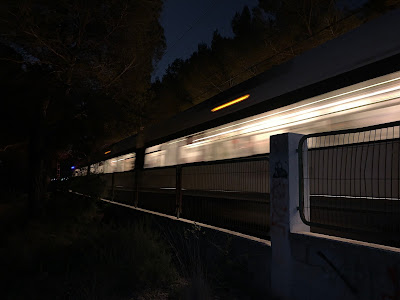Our family has abandoned the practice of handing out Christmas presents between adults. After all, there’s something slightly tedious about putting so much thought into buying a gift for someone who probably won’t like it, and who’ll be under the same pressure to buy me a present that I’m just as unenthusiastic about.
 |
| Matilda enjoys walks in the woods |
Christmas morning was the time the lunch was being cooked, a nut roast to accommodate the vegetarians present. A long challenging process for which Danielle needed peace to concentrate. The results, incidentally, were impressive.
The best offer of help I could make was to take Matilda out to our local playground. An offer I made with trepidation. I’m hopeless with little children. It’s true that it may be, at least in part, my very fear of being hopeless that makes me so hopeless. Knowing that, however, doesn’t make it easier to be any less hopeless.
Still. A playground visit’s a pretty straightforward thing, and I’d taken her to playgrounds before. The trepidation was far from the worst I’ve felt.
Let me tell you about our playground. We’re terribly grateful to our local council for having put it in. Although we’re less grateful for taking from the end of June to the early of autumn to get the thing built at all. And then to leave it without a proper barrier to separate the children from the road ever since. All that keeps the kids from the traffic is the usual thin wire fence builders set up, and it’s still in place.
Fortunately, a gap has been made in it, either by the builders themselves or by local residents sick of having a perfectly serviceable playground in plain sight without being able to get access to it.
Matilda and I found the gap and entered this wonder world of slides and swings and climbing frames and a thing that spins round and round. In fact, it was that last thing that caught her fancy first. It’s a bit like an office swivel chair but firmly anchored to the ground. You can get it spinning pretty quickly, as she did, until she was twirling so fast she got flung off it.
 |
| A swivel chair made for fun |
The only long-term effect of her fall seemed to be that, though she still liked to go on the swivel-chair thing, she kept her speed down. Wisdom learned from a less than successful experience? I wish more adults behaved with such maturity.
I could feel the bonding process deepening between us as time went on. I’d help her up stairs, I’d follow as she walked along narrow raised walkways, I’d be waiting at the bottom of the slides. But it was all going swimmingly. Trust and warmth was growing between us.
 |
| Balance? Child’s play for Matilda |
 |
| Walking Toffee is our new thing |
Matilda came up on my shoulders, and the dogs trotted along with perfect behaviour next to us.
The night slowly fell. And suddenly – I don’t know whether it was the darkness that made her think that way – Matilda decided it was time for a lead again. Not for Toffee this time, though, but inexplicably for Luci.
“Not until we reach the end of the wood,” I told her, “it’s too soon to put her on the lead now.”
Matilda, who has developed a real skill in saying the word ‘no’, has still not wholly mastered hearing that same word when pronounced by other people.
But her granddad has learned not to argue. For the next ten minutes, Matilda chased around after Luci, trying to put her lead on. Luci can look after herself, so she kept darting away each time Matilda got close. It exhausted me just watching the way Matilda was running after her, with an energy born of determination, cheated though it always was.
By now it was fully dark, with only a glow reaching us from the streetlights beyond the metro line we were following towards the end of the wood. Matilda was unfazed by the darkness. What was there to be afraid of? In fact, when the first metro train passed us, she was so preoccupied with trying to put Luci on the lead that she barely noticed. She merely glanced, in a slightly irritated way, at the noisy thing rattling past, and only when it was at its closest and noisiest. Then she refocused on Luci.
Inexplicably, however, she gave up on the Luci chase, for no obvious external reason and without warning, as suddenly as she’d started. It was like the swivel-chair thing in the playground. Wisdom had dawned. It was what Granddad had been saying all this time. The time for leads hadn’t yet come. She stopped insisting.
Instead, she came over to me and raised her arms. Time to be carried. And that provided for another display of wisdom. She now weighs 15 kilos, far too much for what we’ve come to know as ‘cuddle-carrying’, in my arms. If I’m to carry her, she has to go on my shoulders. She’s adapted to this initially unwelcome variation, even learning to duck left or right if we pass under low-hanging branches.
She’d recovered her equanimity.
We left the wood soon after, and put both dogs back on their leads, with Matilda once more proudly in charge of Toffee. That’s when the second metro train went rumbling past, and this time when I said, “look, Matilda, the train. With people inside”, she looked at it properly. And laughed at this strange, noisy sight. All part of the oddness that marks walks with Granddad. As odd as having them last into night time.
 |
| The fun of a night walk |
It was all lots of fun or both of us. And a real eye opener for me, above all, because I learned how fascinating a two-year-old can really be. And how much easier it is to look after one once you’ve realised that.
All of which made for a heck of a Christmas present.








